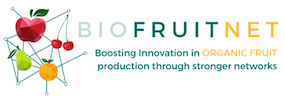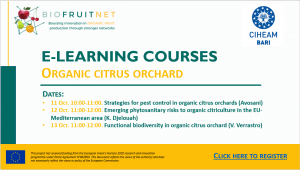E-learning Courses on Organic Citrus Orchards
Courses on organic fruit production will start on 11 October with a course on organic citrus fruit production. The courses will be held online on 11, 12 and 13 October. Each of the sessions will last one hour and will deal with specific topics of organic citrus production:
- 11 October from 10:00-11:00. Strategies for pest control in organic citrus orchards (Avosani).
The course will explore strategies for managing pests of citrus in the framework of organic agriculture. The course will focus on the major pests of citrus and will describe the available techniques (i.e., biocontrol, biopesticides, etc.), especially compatible ones, as well as the most promising and innovative under development. The trade-offs and applicability of the presented strategies will be discussed using a transdisciplinary approach.
- 12 October from 11:00-12:00. Emerging phytosanitary risks to organic citriculture in the EU-Mediterranean area (K. Djelouah)
Organic citriculture in the Euro-Mediterranean area is subject to the constant pressure of several pests and pathogens. The global trade associated with the movement of goods and people increases the risk of introducing new harmful organisms into this area. Whether aliens or not, these organisms may become invasive and more harmful in favourable climate change and the absence of adequate control strategies. Unfortunately, recognition of these exotic pests and diseases tends to occur when already established. Their containment is almost impossible, and preventive measures such as using the ‘healthy’ citrus plant material, efficient quarantine measures and particularly the rapid identification of these pests/pathogens are the only valid strategy for their control.
- 13 October from 11:00-12:00. Functional biodiversity in organic citrus orchard (V. Verrastro)
The short course will explore the main factors influencing the agroecosystem of the organic citrus farm. The course will develop all the tools able to maintain and increase soil fertility, restore biodiversity, use natural resources at their best, recycle organic farm matter, maintain the marginal areas not cultivated and all the useful strategies. A list of different strategies/methods will be illustrated according to a complementary approach, including pest control and soil fertility.
The attendance to the course requires previous registration through the following form.
Don’t miss this opportunity to learn about organic citrus production from top researchers.
Follow us so you don’t miss the launch of the rest of the courses.


